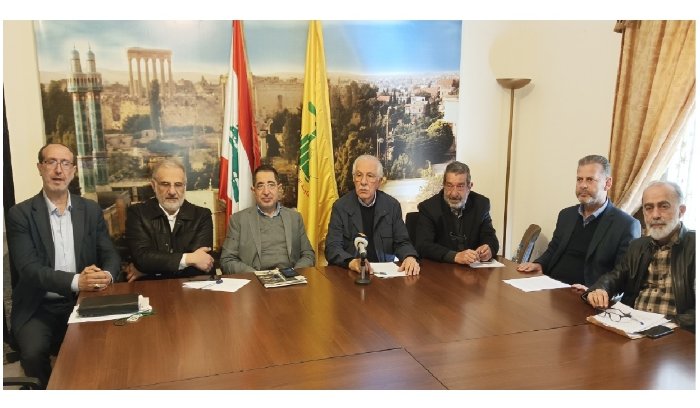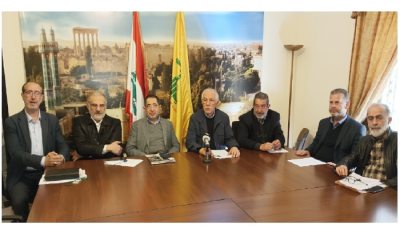The Baalbek-Hermel parliamentary bloc held its regular meeting in its office in Baalbek, chaired by MP Hussein al-Haj Hassan, with the presence of members MPs: Ghazi Zaiter, Ali Al-Muqdad, Ibrahim Al-Moussawi, Yanal Salih, and Melhem Al-Hajiri. The bloc discussed the political, economic, financial, social, educational, health, and service situations.
MP Zaiter read the statement issued by the attendees, indicating that the bloc "calls on political leaders to move beyond their narrow calculations concerning the presidential election. It invites them and national partners, parliamentary blocs, and parties to respond to the necessities of national interest, which require consensus among all forces on a president chosen by the Lebanese people rather than by international and regional foreign powers with their ambitions and interests in Lebanon."
He considered that "internal dialogue should produce a president who unites everyone, followed by a government that develops strategic visions and implementation plans to rescue Lebanon and its people from the hellish social, economic, financial, and health situations they are experiencing, as well as from the corruption system that has led the country to near-total collapse."
He viewed that "the American political and economic aggression aimed at subjugating Lebanon and its people and resistance to comply with the imposed starvation war conditions, represented by submitting to American and Israeli dictates, obliges officials not to heed blatant American interventions in several aspects of Lebanese political life, but rather to strive to provide solutions and remedies to alleviate citizens' suffering, and open new economic horizons with all friendly and brotherly countries, as it is an urgent and necessary need for all Lebanese."
He added, "The cost of health, pharmaceutical, and hospital bills has greatly exceeded citizens' capabilities, confirming that we are facing a health disaster and a collective death sentence against thousands of patients if the Central Bank Governor and the Ministry of Health are not compelled to adopt alternative health policies to the current ones. Measures must be swift to maintain health security and protect the safety of the Lebanese people now and in the future."
He stated, "The Baalbek-Hermel bloc addressed the financial situation and the surge in the exchange rate of the dollar due to the monetary policies adopted and still being adopted by the Central Bank of Lebanon, which need to be reviewed and corrected, as this has caused a rise in the prices of what citizens need in their daily lives. Therefore, the bloc demanded the caretaker government to take necessary measures with the Central Bank to work on controlling the exchange rate. The bloc emphasized the need to impose the strictest penalties on anyone manipulating the dollar exchange rate and the livelihoods of citizens."
The bloc expressed regret for "the missed opportunities by state officials that could have provided definitive solutions to the electricity issue," asserting the "necessity for Electricité du Liban and security agencies to follow up on electricity problems, repair faults, and prevent ongoing attacks and thefts on substations and transmission lines."
It questioned: "How can a citizen pay the electricity bill at the new tariff, which is a high cost given the rise of the Sayrafa rate on one hand, and partial service on the other, while being required to pay a full subscription, and not adequately benefitting from electricity supply, while also needing to continue subscribing to generators or installing alternative energy?"
It stressed the "necessity to save the academic year," demanding the Ministry of Education and all those concerned with educational matters to "do justice to teachers in public schools and the Lebanese University, and grant them their financial rights."
The bloc renewed its "full solidarity with retired teachers in private education, who have been retired for a year or more and are waiting for their pension salaries, due to the unjust and oppressive decisions issued by the Central Bank Governor and the Banks Association, prohibiting opening accounts for them and other citizens in banks."
Zaiter concluded by stating that the bloc addressed certain despicable, inflammatory, and sectarian remarks made by some individuals who consider themselves sovereign politicians regarding national matters. Instead of engaging in elevated and responsible political discussion and dialogue, these individuals have resorted to a low level of discourse that reflects their personalities and the questionable agendas they harbor.




